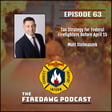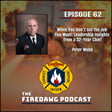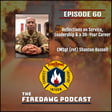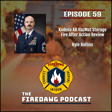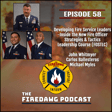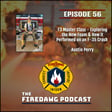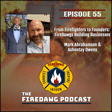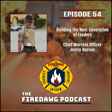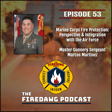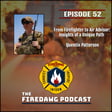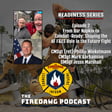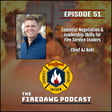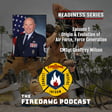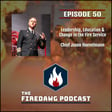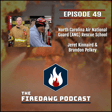Become a Creator today!Start creating today - Share your story with the world!
Start for free
00:00:00
00:00:01

57. The Power of Doing Hard Things with Ultramarathoner & Firefighter - Justin Andreas
In this episode, Matt joins Justin Andreas, an ultramarathoner, run coach, social media influencer, podcaster, and current Deputy Fire Chief at Eielson AFB. They dig into the power of doing hard things—and how stepping into discomfort builds real resilience you can carry into every area of life. Justin shares why carving out time for the things that ignite you isn’t just a hobby—it’s a critical part of thriving on duty and off. Whether you’re chasing big goals in your career, your fitness, or your personal development, this conversation shows how leaning into the hard stuff shapes you into someone who’s ready for anything.
Transcript
Introduction to Fire Dog Podcast
00:00:01
Speaker
This is the Fire Dog Podcast.
00:00:14
Speaker
Welcome, my name is Matt Wilson, and thank you for listening to episode 57
Guest Introduction: Senior Master Sergeant Justin Andrees
00:00:17
Speaker
of the Fire Dog Podcast. In this episode, I sit down with Senior Master Sergeant Justin Andrees. Justin currently serves as Deputy Fire Chief at Eilson Air Force Base in Alaska.
Balancing Life as an Ultrarunner and Fire Chief
00:00:25
Speaker
Justin joins me today to speak about his off-duty adventures as an ultramarathoner, social media influencer, running coach, and how he can find time to pursue his passions. while still leading a productive and successful Air Force and Fire Service career.
Building Resilience Through Discomfort
00:00:37
Speaker
We dig into the power of doing hard things, how stepping into discomfort builds real resilience you can take with you into every area of life.
The Importance of Prioritizing Passions
00:00:45
Speaker
Justin breaks down how he balances work demands with his personal pursuits, and while prioritizing passions is key to thriving both on and off duty.
00:00:53
Speaker
It's my pleasure to welcome Justin Andres. What's up, Justin? Hey, what's going on, man? how are you? Good to have you on. Yeah, you got me at 4.57 at Society. Yeah, man.
00:01:05
Speaker
Yeah, I did that on purpose. I said I can only do mornings because I knew you were in Alaska. Yeah, I feel like, ah yeah you know, yeah, okay. I'll get you back one day.
00:01:14
Speaker
And one thing i was thinking about yesterday was I had Austin Perry on, we had Austin Perry on the last episode and now you. And so it I guess it pays to know the host of the podcast because I came from Ileson and I'm just interviewing all people. Yeah, I know. It seems weird. Like you would have thought that when you were stationed here with me, we could have just done it together, you know, in a room at the station. But, you don know, here we are. nope we got to be we got to be virtual, man. I can't do it in person. got to do be the most difficult that we can be. Yeah.
Justin's Air Force Career Journey
00:01:44
Speaker
Well, as I mentioned in the intro, Justin is the deputy fire chief at Ilsen. He also has some off-duty pursuits. um just if Some could say that, yeah, just a couple.
00:01:57
Speaker
Some could say maybe he he leans into those a bit more than work. I don't know. That's up for debate. I would see that some would say that, yeah. um But before we get into any of that, man, tell us who you are, how long you've been in the Air Force, where you've been stationed, without whatever else you'd like to share with us.
00:02:17
Speaker
Yeah, Justin Andrees. I've been in the Air Force for 19 and a half years. ah Started my first career base off at Barksdale, Louisiana, old Barkatraz.
00:02:28
Speaker
as it used to be called. I put in for all overseas assignments, and I got 45 minutes from my hometown, so that was exciting. But it allowed me to ah continue my relationship with my girlfriend, then my fiance, and now my wife of 17 years. So ah there's there's always positives in some in a negative sometimes. But from there, I took my career to J-Bear. One month after me and my wife got married, we hauled all of ourselves and our lives up to J. Bear and did four years in Alaska, ah two deployments from there, one to Iraq.
00:03:03
Speaker
Then I went to Mildenhall, England, um learned that ah seasoning is a real thing and it is required on the food over there in in England.
00:03:15
Speaker
um Three years there, ah two deployments out of that out of that assignment. From there, I went to Anderson, Guam. I was in the main station for about a year, and then I PCA'd over to the Red Horse Squadron, the 554 Red Horse Squadron, to become a Silver Flag and Rescue Instructor.
00:03:33
Speaker
And I did that for about two and a half years. 2019, I left and went to, oh my gosh, i'm um it's like I said, it's five o'clock in the morning. I went to ah Ellsworth, South Dakota,
00:03:48
Speaker
um Absolutely fell in love with that place. And one deployment out of there, three years there. From there, I took an assignment to clear Alaska to be the deputy fire chief, ah not knowing at the time when I applied for the assignment that the fire chief was ah going to be released and I was going to be taking over as the fire chief. So that was kind of an interesting assignment as a master sergeant to step into a fire chief role. But being that it was such a ah small department, but it had an amazing staff on duty that, you know, it was so smooth and it was, you know, just the transition. Once the fire chief came in, it was great.
00:04:28
Speaker
um And then from there, I PCS'd up to where I am now at Ielson, Alaska. my man loves Alaska. You know, uh, I do, but you would think that, I don't know. And like, I like it. i you know, I love it, but it's not something that I want to call home permanently, but it just, yeah you know, the way that things have worked out, it's, it's really easy to go from clear to, you know, a remote assignment to either Jay bear or Ielson. I put Ielson as a follow on option and,
00:05:00
Speaker
Because I'd already been to J-Bear. I didn't want a base repeat. And so, um you know, it's it's considered to the Air Force a low-cost move. So it was easy. Most people that go to CLEAR, they they do a follow-on remote or follow-on assignment to either ILSEN or J-Bear.
00:05:16
Speaker
Which makes sense because you live in Fairbanks. But you and I have talked about this a little bit, a lot probably, the... um you know I think i I liked Alaska probably better than you did little bit. Not to say that you didn't like it, but you're ready to go to warmer warmer pastures, let's say, man, like because it it gets cold there, and that that gets old quick.
00:05:37
Speaker
Yeah, this will be my fourth winter up here in the interior, and it's – yeah, – Well, you know, i' I'm sure we'll get to this, but, you know, I'm a runner and I run full time outside, you know, and, ah you know, Matt was my my running partner last year in this, you know, a couple days ago i was out for a run and it was really cold. And I was just thinking I was like, man, I miss those days of, you know, me and you just going out and.
00:06:02
Speaker
passing the time on our long runs when it was what 38 39 below yeah's yeah it's if you're gonna be out there and potentially die it'd be nice to die with somebody yeah you know at least you have somebody to uh to hold your hand as you as you perish yeah man those were fun man i enjoyed that um I feel like I enjoyed that more than running in hot weather.
00:06:24
Speaker
Yeah. Which I don't have too much experience with, but certainly a little bit. um Because I started my distance running journeys up in Alaska, thanks to Justin and his encouragement, as he ah he's well known for encouraging other people to get out there on the trails or on the roads.
00:06:43
Speaker
And that's what he does a lot on his off-duty time. So we'll jump into it. Ultramarathoner. um This one to me, even even though I'm kind of in the space, I say a little bit, I was at least before I was you know injured. and um Ultramarathoning to me is just wild, man. like you Even knowing people now in it, knowing you and knowing the space a little bit, I'm still fascinated with it. Yeah.
00:07:10
Speaker
Who gets up in the morning and like, yeah, I'm going to run 100 miles or 200 miles, and in some cases 300 miles. You're just like, who thinks of this? you know and And then you tell me about like the Appalachian Trail journeys that some of those guys have, and it's just like, I'm going to see if I can do this the fastest. like First of all, who has time for this?
00:07:28
Speaker
like that's That's my first question. like This guy's like, yeah, I think we could do it in 45 days. or I think you know like the... the records, out I can't remember what the records are. listened to your podcast about it but, um, but who has time to go for like 40, 50, 60 days just to walk and run a trail across the country? Like, that's amazing to me, but yeah, well, first off it was 42 days and the record was just 42.
00:07:51
Speaker
And that's fastest known time. yeah And then you could do supported unsupported, right? Yeah. There's supported, there's unsupported and there's, uh, self-supported.
00:08:03
Speaker
Okay. And 42 was supported, right? Where he was sending himself things and self-supported, self-supported, that's true so supported. You have a crew with you, ah self-supported. You're doing it all by yourself. You're having to mail yourself packages.
00:08:16
Speaker
You can't take any outside help. um And then no support, ah a long trail ah adventure like that that's over 2,000 miles is impossible to do unsupported because right you have to carry everything. So those are typically your shorter trail, like 150 under, you know, where you can carry everything that you're going to need Just 150. Yeah, yeah. But those guys that are going out for those fast known time trials are are fast.
00:08:43
Speaker
So, you know, they're they're not out there as long as what, say, I would be. Right. A few months. Yeah.
00:08:51
Speaker
Then get in a hotel. Yeah. Yeah. Living in luxury here. I'm not carrying my tent. Are you kidding me?
00:08:58
Speaker
Yeah. So fastest known time because nobody really knows. Right. I mean, we know like they know in the community how fast this guy did it or that person did it. But ah it's hard to say whether or not somebody else did it faster. So that's why they call it the fastest known time um to my understanding. But yeah, ah the one that we're referring to is the Appalachian Appalachian Trail.
00:09:18
Speaker
ah Jeff Garmar just broke it. And if you think about how crazy it is, he broke the record by four hours. And it took him 42 days to you know to break the record. So the amount of math and calculations that it takes. The margin of error is so small. So small.
00:09:39
Speaker
Four hours. I mean, that's nothing when you're thinking. That's a bathroom break. Yeah. you know yeah I mean, essentially. you know like And he had so many things go wrong. Yeah. ah on those when you're self-supported you mail yourselves packages for to like resupply yourself and uh one of his resupplies that had his shoes in it which you know you change out every three four five hundred miles didn't show up so he had to go an extra 300 so miles in a pair of shoes that were already worn out and you know just things very significant it's not like it's not uh if things happen or if things go wrong but it's when and how you handle them and
00:10:16
Speaker
And I think, ah you know, that's a lot of what ultra marathoning is, you know, it's not if something is happening and if something goes wrong, but when and how do you handle it?
00:10:27
Speaker
And, uh, and that's what breaks a lot of people down when it comes to, to these races is they can't handle when things go crazy and go wrong, you know? Yeah. yeah It's almost, it's more of a mental sport than it is a physical.
00:10:42
Speaker
I mean, it seems to me anyways, and, you know, dabbling in distance, I can certainly say that, you know, you face that mental situation, that mental roadblock, mental struggle, like so often and your body is capable of so much. It's really your mind that's kind of telling you a stop.
00:10:59
Speaker
Oh yeah. And, you know and their logistical, They're logistical feats too, man. The logistics, you know, that necessary for long distance ultramarathoning especially is just crazy to me.
00:11:12
Speaker
And then the equipment and just dialing all that in. It's just, it's not just running, man. There's so much to it. And um so, yeah, Justin is ultramarathoner. And the reason um we brought him on was, you know, it's...
00:11:26
Speaker
we talk ah about work-life balance and you know justin is a full-time deputy fire chief you know he has ah a day job but he's also getting these things done and i think that the things that you learn as an ultra marathoner as a runner they're transferable to the military to the fire service and you know they can help build resilience and help you be better in your day job whatever that happens to be and so i i just feel like it was good to bring them on so man justin tell me about ultra marathoning and how you got into it? Like, how do you start out getting into something like this? I have no idea. Uh, you know, I was always, uh, I was always a lifter.
00:12:01
Speaker
um you know, I, ah lifted all through high school. I ran track in high school, but I wasn't serious about it. Um, you know, and then I got into the military and I continued lifting and, you know, I just wanted to be a, you know, just like your, your typical bro. Uh, you know, your young firefighter just wanted to be huge. Um,
00:12:20
Speaker
And eventually I got bored with it. I tried the CrossFit thing. It wasn't for me. um You know, I tried the like Olympic lifting also wasn't for me. um When I was in the Red Horse Squadron, there was a another runner triathlete ah who was, you know, pretty big into the scene in in Guam. And he was a There was a ah marathon coming up within, i think it was so four weeks out or something like that, and they had a half marathon option. I always wanted to do a half marathon. I just thought that that was like the pinnacle of fitness was the half marathon.
00:12:55
Speaker
And I asked him, I said, hey, how long would it take me to train for a half marathon to be able to run it next year? And he's like, what do you mean next year? It's four weeks away. You have plenty of time. Now I'm saying this with going in, I had a lot of fitness.
00:13:11
Speaker
I don't suggest someone four weeks out from a half marathon go try to run one. I don't think that's safe or healthy. I had a lot of fitness going into it. um you know i was I was cross-fitting at that time, so there was a fair amount of running involved in my fitness.
00:13:28
Speaker
so But anyway, he wrote me a little training plan for four weeks. I ran the half marathon. I fell in love with it. I thought this was the coolest thing. My goal the next year was to run the same race but run the full marathon.
00:13:41
Speaker
I ran it, and I hated it. I was like, why would you just double the distance? This is awful. Half marathon is where it's at. Um, and yeah, so that was, that was, uh, 2018, 2019. I didn't get to run because I was PCSing, but I PCS to South Dakota and through my marathon training, I i started listening to podcasts and i was discovering a lot of podcasts where there's these people that go out and they run on trails. And I never thought to myself, like running on a trail, you know, you hike them, but
00:14:12
Speaker
running them sounds a lot more fun to me. So when I got to South Dakota, I kind of got in with a running group there. I discovered trail running. And then when you discover trail running, ultra runners are right behind it. And so you can throw a rock and hit 10 ultra runners that have run over hundred mile races and so in in that little run group there. And so when you start hanging out with people that make bad decisions, you yourself start making bad decisions. And so 2020,
00:14:39
Speaker
ah in twenty twenty I, before the shutdown, I ran my first, um, first ultra marathon. It was a 50 K.
00:14:52
Speaker
Then half marathon. It's, it's hilarious to hear you say that you fell in love with a half marathon knowing, you know, yeah, you know, you know, I still do. I still love the half marathon. I think it's ah it's a great race.
00:15:04
Speaker
Um, it's a real, to me, it's a real test of fitness, It really is. yeah um The marathon takes a lot out of you. If you go run, you know, I mean, you know, you're this yourself, you've run a marathon, but um the marathon drains you to a point where you have to take a couple of weeks off, you know, like the body heal.
00:15:22
Speaker
ah You're going to be extremely sore, not saying you're not going to be sore after a half marathon, but the recovery time and is a lot shorter than the marathon. And I feel like it's a really good test of fitness.
00:15:33
Speaker
You can go out, you can, you know, blast yourself and and then you're done. You know, in an hour 40, hour 30, 20, whatever you're running it in, as opposed to, you know, three hours, four hours. And it's so just the drain on the body on the marathon is a lot. So, yeah, the half marathon, I still love it and I still run them to this day.
00:15:52
Speaker
Yeah, it's the first race I feel like in the iteration of races where you have to plan. yeah you have to You can get away with running a fast 10K with like, you know, but there's people that could get away with running a ah fast half marathon with nothing. And those people are freaks in most cases. yeah But it's the first race where you need to have a plan, I feel like, with fueling and with gear and and really a race strategy, like how you're going to pace yourself. You know what i mean? Like there's people that go out and just sprint 10Ks and just, you know, and and b be okay. You know, the the half marathon is the first one where have to kind of strategize a little bit more.
00:16:28
Speaker
And then even more so with the marathon, which to me, people who do it fast are, they're incredibly impressive too. oh yeah I guess anybody that runs fast is... you impressive.
00:16:40
Speaker
But anybody that can run long is equally impressive. And you and I have had this conversation, I think, you know, a lot. um And it's, for those of you don't know, like the marathoning scene, marathoners, 26.2 mile and below, half and full marathon and ultra runners or ultra marathoners are like two different communities.
00:17:05
Speaker
And it's something you don't know going into this, like, so you know, what everybody I think is a runner, especially if you're in the military and the, in the fire service. But when you step into the marathoning world and the ultra marathoning world, it's so funny to see the, the differences between ultra marathoners and marathoners. Like the people are different. The personalities are different.
00:17:24
Speaker
The gear is different, like different shoes, different places that you go, you know, and it's, it's kind of a different ways of thinking. um
00:17:34
Speaker
So i know I just found that interesting when i first stepped into space. but um I have ah a buddy of mine who's a who's also a runner, and he he's he's a sub-three marathoner. He's 17-hour, 100-mile runner. He's ah an incredible athlete. You know Nick.
00:17:48
Speaker
um he He describes them as two different sports. he He's like, the mentality is there. You know, the all the gear is different. He's like, yeah, you're, you know, it's like the NFL versus the flag football league, right? They're two, yeah, they're still one in the same. You're playing football, but they're two different sports, you know?
00:18:08
Speaker
One is is all on the road. One's set for pace and, you know, that you're you're super focused. The other one is just more of like a community-based. Yeah, you're still, you know, out there challenging yourself, but it's more...
00:18:22
Speaker
a challenge against yourself rather than the other people. And so I do, I agree with him, you know, and like I'm, I'm considering putting myself into a mountain race this next year.
00:18:33
Speaker
and those are races that have over 20,000 foot of climb. Like the amount of running that you're going to be doing in that hundred miles is very slim there. I would be willing to say that you'll probably run less than 20 miles in the entire hundred mile race, but you know, it's like, so that's a completely different sport compared to running a marathon.
00:18:52
Speaker
Yeah. Ultramarathoning is a lot of walking, lot of hiking. It's called power walking, Matt. Power walking, power hiking, whatever you want to talk I'm sorry. i didn't even know my own terms. um But yeah.
00:19:04
Speaker
So, you know, again, I'm fascinated with ultramarathon and I think it's ah it's a good thing to highlight ah for you. So walk us through like a hundred mile experience. Like what does that look like? How do you prepare?
00:19:15
Speaker
ah What's the experience like during a race of a hundred miler? Yeah, so first you've got to back up and you've got to prepare yourself, right? And so you mentioned the preparation phase, and and that's that's the most important phase. so ah we yeah I'm sure you we've mentioned it before, but I'm also a and you know a trail and ultra running coach, and so I prepare my athletes to run these 100-mile races as well. And and i always break it down for them, and I'm like, look, this training period, this is where you run your race.
00:19:41
Speaker
The actual race is where you just go get the buckle. Yeah. And so the training 100-mile race is sometimes six months of preparation for that. So the actual training period is probably only going to be about 24 weeks, but you're going to build up to a consistent base of mileage per week, whether, you know, that's typically 30 to 40 miles a week is your consistent base.
00:20:08
Speaker
And then once you hit the beginning of that 24 week training period, that's when you start to ramp up your mileage to get, you know, 50, 60, 70, some of the, the big elite,
00:20:18
Speaker
you know, athletes, they're up all the way up to 100, 120, 150 miles per week. ah You know, those are individuals that get paid to run, not working full time, also have a family. So, You know, work in the life, work-life balance. ah You know, I do have a full-time job. I do have a family. i have a young daughter. You know, you have to balance all of that. So ah that training period is hard sometimes. You're getting up at hours that everybody else is asleep to get in the miles, those lonely dark miles, the cold miles. You know, you're getting on all this stuff, and you're preparing yourself. You're not only preparing your body, but you're preparing your mind. And I think that's the most important thing
00:20:56
Speaker
thing when when you're training for these hundred mile races is preparing the mind because we talked about it earlier it's not when something breaks down but it's or it's not if something breaks down it's when something breaks down and knowing how to handle that because when we go out for these training runs sometimes our training runs are 30 plus mile training runs that are going to take 10 12 hours and we're doing that on purpose to kind of mimic race day conditions um ah And, you know, things are going to happen on those training runs, and it's learning how to handle them, how to prepare you know prepare yourself for when race day comes and those things break down. You're like, man, I've already been here. I know how to take care of this. but
00:21:35
Speaker
So I think the preparation phase is an important phase to to highlight because it's so many weeks of buildup to this one single event that's going to take place in one day.
00:21:47
Speaker
Yeah, it's the bulk of it, right? Like like you've mentioned, it's it's almost a part-time job. and in And just for me training, doing marathon training, um not ultra marathon training, and we've talked about this, that the mileage, depending on you know who you are and what you're trying to, it's almost it's it's pretty close. You were running a lot more than I was, but you know I was running 30, 40, and sometimes 50 miles a week.
00:22:08
Speaker
And that is a time suck, man. Like that takes That's a part-time job. Yeah, that's so that's really, what do you think? Like, probably 95 to of what you're doing is preparing.
00:22:22
Speaker
Oh yeah. and, and I, we run in miles and we discuss miles, but the really the important thing when it comes to ultra marathoning is time on feet. And so we're running the miles, but we're also looking at the time on feet. And so, you know, in peak training, I'm running 12 to 15 hours a week.
00:22:43
Speaker
That one training run that's like 30-plus miles, that's going to beef up my training to 20, 25 hours for that week. But think about That's 12 to 15 hours a week. And that's not sustained – I'm doing that for the 24 weeks, but – ah think about i mean that's twelve to fifteen hours a week and that's not a sustained you know i'm not doing that for the full twenty four weeks but you know I'm doing that for at least six weeks leading up to you You kind of build up to a peak. Think about a mountain. You build up to a peak, and then you you taper, so you're going down, you're lowering your mileage, and then until you have the race day. But at that peak, which is about three weeks out from race day, that's where your big, big mileage is. ah you know Two to three weeks before that as well.
00:23:27
Speaker
And so that's when you're getting those 12 to 15 hours, sometimes 20-plus a week to prepare yourself. Yeah. Yeah, I mean, where do you find 20 extra hours in the week to to go out and train but still you know work full time, have a family?
00:23:44
Speaker
you know It's like you're you're running after everybody has gone to bed. You're running before everybody wakes up. ah you you're definitely going to have to sacrifice some a Saturday or Sunday. Or both. I mean, i you know when Matt and I were doing some long runs together to prepare for a race that I ended up not running and Matt took a podium spot on, ah we were well I think we were meeting at 4 a.m. in the morning on Saturdays you know and and still having to sacrifice a little bit of time because we didn't get back until 8 or 9 o'clock.
00:24:15
Speaker
and so Stop at the bagel shop? Yeah. Well, we won't talk about our bagel stops. I brought some home to Dwight. Yeah, you got to refuel. I mean, come on. so yeah But yeah, it's just, it's a lot of time. And so that that preparation period is extremely important to prepare yourself, not only physically, but mentally for the race.
00:24:33
Speaker
And I think the reason reason I kind of want to dig into the details of this is now we're not suggesting that everybody needs to go out and do this. Or, you know, you if you're not passionate about something like running, which it seems to me like people, so most people aren't, but I would argue that you'd probably like it more than you think.
00:24:48
Speaker
But I think that it just provides a good example of like, discipline and, and building resilience, like you're just so much better in life. Like when you put yourself through something like this it and you plan out your week. So I, I didn't, you know, when I'm in a training block, I'm not drinking alcohol. Like I'm going to bed early so that I can wake up early in the morning.
00:25:08
Speaker
I'm sorry. Yeah. um And, and early in the morning, you're putting yourself out in, in really cold temperatures. You know, you're putting yourself through these challenges every single day, day in, day out. And.
00:25:19
Speaker
Yeah, it makes you a good runner, but it makes you good in life. You know, like things that come to you, any kind of challenges come to you you're like, man, I just, I was just outside and like negative 39 degrees for like two and a half, three hours.
00:25:29
Speaker
I think I can handle this problem. Yeah. You know? So I just think it's like such a good example um ah to build, to building resilience. You know i mean? So. But talk to me about like a hundred. So we talked about preparation and how much goes into that. And you know, it's, there's so much that we can talk about on and running and I would love to, but I'd really want to like, what's the experience like for a hundred miler? Like what's it like to finish a hundred mile race?
00:25:55
Speaker
it is an undescribable feeling. It really is. Knowing that you just traversed a hundred miles. It's a, it's a very emotional experience. if Even if you're not an emotional person, you'll, you'll choke yourself up because it's such a, an emotional experience. Um,
00:26:17
Speaker
I recently went to one of the biggest races in the US, s the Javelina 100 out in Arizona. One of my athletes was running and I got to pace her. ah Pacing is just where you jump in and you help out your athlete. You can't carry anything for them.
00:26:32
Speaker
You're more there just for like moral support, making sure that you you know they're still maintaining their pace that they need to maintain. you know just You're just there to help them out basically. um They call them pacers. so And so we we were running and she started getting really emotional. And and I knew this was coming on because it it happens to a lot of people that I've paced before. And we were about two miles from the finish line. um I could kind of see where the finish line was.
00:27:00
Speaker
and And I had her shut off her headlamp and I shut shut off my headlamp in middle of the night. And i I told her, I said, just look up at the stars. yeah And just reminisce on the months of training that you've put for I'm getting chill bumps right now.
00:27:15
Speaker
The months of training that you have put in, the early hours, the late nights, the sacrificing from your family to go do a run, every single thing that you put forth to run this race, just think about it here.
00:27:31
Speaker
And she just like, it just, it overwhelmed her for about two minutes. And we just stared up at the stars and we just took it all in. And then we shut it off and she hauled ass and finished the race in 19 hours. But...
00:27:44
Speaker
It was, ah it's just such a surreal experience that it's so hard to explain the accomplished feeling of accomplishment when you finish a race like that. It's it's it's overwhelming.
00:27:58
Speaker
They say in a marathon, you're going to go to hell and then you'll come out. In an ultra marathon, you go to hell and you come out and you go back to hell and you come out and then you go back to hell again and you might come out.
00:28:10
Speaker
ah you might hallucinate from the lack of sleep because the race is going to start, you know, either early somewhat in the morning to, you know, 10, 11 o'clock in the afternoon.
00:28:21
Speaker
And then you're going to be running until the next day. So you're going to go through the night. You're going to run 12 somewhat hours before it even hits dark. And then so your body's already shutting down. You're already low on fueling.
00:28:34
Speaker
You're not taking in the amount of calories because your stomach, you're walking a tight line with your stomach and, ah you know, you might have thrown up a couple times, but. you know you And then you're going through the night. You're seeing things out on the trail that aren't really there.
00:28:49
Speaker
ah you know I've had a couple of great hallucinations. And I know I'm not encouraging anybody to run ultra marathon. you're not making a good argument for ultra-marathon right now. Sounds awful. But it's just it's all of this is an experience. you know And you want it so bad that you're just going to give up all of this you know to to finish the race. And then once the sun comes up the next day, it kind of just like – it revitalizes you and you're just like, man, I just got this second energy. And then you push through through and you you know, finish the race and hundred mile race What a physical feat though, man. Yeah, it a hundred percent is. Like what, what, ah what can you compare? You know what Like the Iditarod sled dog and there's the Iditarod trail invitation where people run and walk and hike that too. So like, there's nothing really to compare, like as far as like a physical human feat, climbing Everest, climbing big mountains, you know, but ultra marathoning is just...
00:29:40
Speaker
what a sense of accomplishment it must be you know i had to have never done anything else that has given me the high of finishing on a 100 mile race and that you know that's including like running marathons finishing lower ultras um you know i've run tons of 100ks 50 milers you know 50ks nothing gives me the accomplishment of finishing a 100 mile race But the suffering is so intense, though.
00:30:08
Speaker
Yep, the suffering can be. I mean, you can have races that go absolutely great. They go perfect. Right. um Even the elites, even the the professionals. yeah they Yep, they do. They they suffer. um ah You know, a real famous ultra runner named Courtney DeWalter, she talks about her pain cave.
00:30:23
Speaker
And when she goes into the pain cave, she builds rooms in this. So she has she describes it as an entire house. Think of it. You know, each time she runs a race, she enters into the pain cave and she starts just building a room within that pain cave.
00:30:39
Speaker
And she's built this entire house out of this cave because she just goes in the pain cave so much. And it's like. Man, it is. It's true. And it's like challenging yourself and being able to push yourself past, you know, where ah where the majority of people will push themselves to be able to accomplish a single task is, it it it it's really hard to describe how how cool that actually is.
00:31:06
Speaker
She makes her look so easy, too. It's just kind of like, what easy if you're watching like, I don't know, the NBA, the NFL of it on TV, and you're like, They make it look easy. She makes that that sport look easy. yeah And a couple of those athletes. yeah And so you'd mentioned your athlete you get 19 hours. And I know, I think that was kind of a quicker course from my understanding, but 19 hours is an impressive 100. Like people are like, dang, 19 hours, that's a long time. Like she must've been, no, that's a a good time. That's a good time. So for reference, I've run six 100s and my PR is 28 hours.
00:31:37
Speaker
And so I'm not by any means fast. I just enjoy the sport. Back Packer, baby. ah More mid-pack, I would say. ah yeah Back of the pack is you know in in a 32, 34-hour cutoff time.
00:31:51
Speaker
They're in the upper 30s. So 28 would be considered mid-pack. But yeah, 19 hours is is incredible. That's front of the pack.
00:32:04
Speaker
She was top 20 out of the females. And for reference, who what was the winning time ah for female and male? ah The winning time for the male was 1230. um And the winning time for the female, I believe, was like 1320 or 1330.
00:32:21
Speaker
So that's 12 hours you're talking about. What what were they at an 830 Yeah, 780 pace. so yeah I know. Imagine that, you know, like miles and that's running on running on a trail. So like a hiking trail, ah you know, with elevation gain, you know, it's not a flat surface.
00:32:40
Speaker
There's rocks. Well, there's not any routes out there, but there's rocks and it's about a 12 to for reference. Air Force people understand it's about a 12 to 13 minute mile and a half.
00:32:53
Speaker
Right. Or no? No, it'd faster than that. So, uh, it would probably be closer to 11 or two a ten to a 10 to 11, somewhere on there for a hundred miles. It's crazy.
00:33:05
Speaker
Um, so yeah, man. So talk to me about how this, how ultra marathoning has either helped or hurt you in your military and your fire service career.
00:33:17
Speaker
Well, I feel like it's helped and hurt, right? But ah we all know those people that, you know, the smallest little thing comes to them and they're they freak out. and They're like, I can't do this. Or, you know, they just start freaking out. We all know those people. ah You know, they don't just exist in the fire service. They exist everywhere. But...
00:33:36
Speaker
I feel like within our career field, ah you know we're thrown things sometimes that are just out there. They're wild. like ah you know as As we've progressed up through our careers, you know being crew chiefs and you know captains on the you know the engines to you know being, ah like I know everybody hates this term, but the house mouse. And ah you know just progressing up through the ranks of you know in the fire service, we've all seen and done the craziest things.
00:34:04
Speaker
But as an ultra marathoner and being able to push yourself sometimes through what we probably shouldn't be pushing ourselves through your, your, those little minuscule little task or those things that come down there.
00:34:18
Speaker
It's like, yeah, wellll we'll take care of it. It's not a big deal. um And and i I think I've noticed a switch since I started like really distance running and being able to like, man, I had an awful run today. I was throwing up and my body just wasn't having it. But I was 15 miles away from my car. Guess what? You got to come back.
00:34:38
Speaker
So you got to figure out how to get back. You know, your problem. There's no choice along the way ah to get yourself back. And it's like that transition so well. into work and and into life. I mean, these little things come up and you're just like, cool, we'll take care of it. We'll handle it.
00:34:55
Speaker
And so I think that's just been, that is to me, the biggest thing that I have noticed about myself is my demeanor to be able to handle the the everyday thing that comes up all the time. That is not that big of a deal that everybody else kind of sometimes freaks out about, you know?
00:35:13
Speaker
Yeah, what an excellent sport to building resilience. And I know, like I feel like I said that word four or five times, but it really is. and And more so than I was, just like you mentioned early on in the episode, you know I think everybody goes through that lifting phase, especially in our line of work.
00:35:27
Speaker
Everybody's kind of a gym rat. um And listen, that's a great way to move your body. Any movement of your body is good. Walking around the block, tennis, you know, whatever it is you like to do. But there's just nothing that compares to the the level of resilience that'll be built through running and especially long distances.
00:35:43
Speaker
i mean, when you have to figure out how to go to the bathroom, um you know outside when it's cold, you know what I'm saying? like Or I don't know let's say you roll your ankle and you're 15 miles from your car, like you said, like there's you have no choice, yeah especially when you're in the, like of course we we run with in reaches in some cases, Garmin in reaches where if if we get into a legitimate emergency, you know there's always that option.
00:36:07
Speaker
But even still, like, it's still risky. and There's no guarantee somebody's gonna get to you before you succumb to the elements or whatever the case. And it's just nothing like that. There's nothing like that. And especially in the interior of Alaska, where it's just so desolate, man. Like, you are not on top of the food chain, number one.
00:36:25
Speaker
And number two, like, the elements, as soon as you stop moving, Like your body is keeping, is your furnace and it's keeping you warm. The moment you stop moving, like everything is soaked in sweat and like you're going to freeze up real quick. You know what i mean? So just that experience and having to mentally go through that and and be um cognizant of the decisions that you make and It's nothing like it, man. Yeah, I think back sometimes to ah you and I and a couple of our friends went on a training run last year.
00:36:56
Speaker
it was a 20-mile training run, and it was in in the mountains out here. ah you know And we put ourselves in this element knowing that it's going to suck.
00:37:07
Speaker
We got there early in the morning. It's pouring down rain. We had, what was it, a 5,000-foot climb right off the bat to get to the top. And then we kind of curved back around and ran back around, but.
00:37:20
Speaker
It rained on us the whole time. There was the like the trail disappeared. You had to just kind of follow the Karens all the way up. You know, there were sections where you're you're bouldering. So there's just massive boulders that you're having to climb over. And then when we get down to where it's easy running, quote unquote, ah there's these massive like rivers that we have to go through that are waist deep.
00:37:47
Speaker
and it and And when you got back – when we got back to the truck, you had mentioned something. It was like – and I still think about this today, and I think you call it dirty PT. Yeah. And it's like you talked about how if more people did dirty PT, like willingly put themselves into positions to suck, right, that the world would be such a better place.
00:38:10
Speaker
and And I really do. I think about those dirty PT days that are – You know, where you don't really want to go out, but you're out there suffering with your friends. And it's just like, it's a crappy situation.
00:38:21
Speaker
The rain sucks. The rain cleared, but then now you got to cross waist deep rivers. And it's just like, you know, we had fun with it, but at the same time, it still sucked. It sucked. It definitely sucked.
00:38:33
Speaker
I recall that a lot and go back to that dirty PT. and you know And that is some of the things that help you prepare for the races. You like you'd look back on that clip man, if I did that awful 20-mile run that took six hours, then you know that's you know i can handle this. And for reference, if you're running on the road for a 20-mile run, that's a two-and-a-half run.
00:38:54
Speaker
hour run you're done in two and a half hours where a six hour run for 20 miles and in the trails you know that's with five or six thousand foot of climb on top of all the other elements for You mentioned that that race that I podium last year, like it was ah it was a marathon, a trail marathon, but I think I did it in five hours or something change.
00:39:18
Speaker
I got third, yeah five hours, right? like you're you know it's It's amazing to be able to do a marathon, to be able to move a marathon, But most, the the elites are going to win that sucker in three hours, 220, right? Like some of the some of the bigger races, it'd be closer to two hours.
00:39:37
Speaker
You know, I did it in five hours and got third. So like that just goes to show you. And they this year, the year you ran it was a faster year because the conditions were so good. And so like, you know, it was a bit warmer. And so they said it was a faster year. Their times dropped quickly.
00:39:54
Speaker
ah we When we say warm, we mean like 27, 28. Yeah, it was 20. It wasn't 40 below. but But when when it gets that warm, you know, the snow snow gets soft and it moves like mashed potatoes under your feet. So that was a challenge. But it was still nice to have warmer weather.
00:40:11
Speaker
So sorry about that. um Yeah, anyways, where was I at? um i was you know Oh, yeah, dirty PT and clean PT. So I think that and a good example of this in the fire service is...
00:40:23
Speaker
Like if you're like, how do I put myself in a dirty PT? I'm not a runner, man. i don't want to hit the trails. um Get in your ensemble and do hard things. That to me is dirty PT, right? Like that is, come you're not supposed to have a backpack on that weighs 50 pounds, right? An SCPA or whatever the case. You're not supposed to have a winter coat structural ensemble. You know what mean? Like get into that stuff and go, ah raise a ladder, pull a hose or you know do whatever you got to do That's dirty PT.
00:40:49
Speaker
It's just something different about Doing PT like that, then doing pushups, sit ups, planks or running around a track. Now, again, movement is important. Movement is good. But it ah it's just something to be said about the mental resilience bill.
00:41:03
Speaker
It's something you don't want to do. I think that, you know, you know, willing, you're willingly putting yourself into a situation that you don't want to do. yeah that I remember pulling up to the the run you're talking about, the 20 miler.
00:41:18
Speaker
And yeah like you said, it was per pouring down rain. I want to say it was on the cusp. It was in the forty s name I want to say it was a little chilly. It was cold. And I'm thinking like, we're sitting there. We're like huddling under your Subaru like hatch or whatever, like trying to stay dry.
00:41:32
Speaker
And it was such a futile attempt. In my mind, I'm thinking like... I'm about to be soaked in like T minus three minutes. What are we doing? Ahead of like, ahead of 20 miles, like who cares? Like just, you know, just yeah, dive into it and get wet. And I remember like we were, and I looked at my watch and I'm like, I think we were like seven, like three quarters into the first mile and we hit the first like puddle.
00:41:58
Speaker
You know i mean? Where you hit that front where you're, so you could feel the water through your sock. And I'm like, Well, this is going to be a long day. ah But it was, and it was fun. But yeah, then we get to the end of it and you're waiting in waste to chest level water because it was a heavy rain. And you're like, whatever, dude.
00:42:20
Speaker
Yeah, and and, you know, admin note, wear Mirena wool socks because those things, there's nothing better. Don't wear cotton ever. Mirena wool is the best for circumstances like that. Summer and winter, I wear them year-round.
00:42:35
Speaker
Same here.
00:42:38
Speaker
Well, man, I want to get into your coaching, too. So we talked a lot about your experiences as an individual, and you hit on it a little bit, the coaching. But first of all, how did you get into running coaching? And I want to talk also about how that's kind of helped you, too, your career.
00:42:53
Speaker
Yeah, so i've always I've always had a coach when it comes to the running thing because, you know, starting out running that half marathon, ah you know, my friend coached me i I, I, I've always thought that I can, you know, you can, you don't know everything, right? There's always somebody out there that can teach you something. And so I've always had a coach and I've bounced around to different coaches, whether I like don't like their style or, you know, want something different or, you know, hiring a ah speed coach for a marathon versus an ultra coach, you know, completely different. So, um, but I've always had a coach and I've always enjoyed being coached and it kind of takes that
00:43:31
Speaker
guesswork out of it, right? I just log into the app and boom, I got, got my plan that I'm doing for the day and it makes it that much easier. Um, they're doing all the work for me and that's what I've always liked about it. Just take that one aspect out of my life that I have to deal with. But, um, I, I,
00:43:49
Speaker
before i was actually certified and this probably shouldn't have happened, but, um, you know, I had, I had ran a couple of marathons and, you know, I kind of knew what I was doing, but not, you know, not really because I wasn't certified, but I had some people like, Hey, can you build me something to run a marathon? And,
00:44:06
Speaker
You know, i built them ah ah plan either for their half marathon or, you know full marathon. And this was back in 2020. And i I thought it was just the coolest thing because the first time I did it, I was deployed.
00:44:19
Speaker
And, ah you know, they do the Air Force marathon. When you're deployed, they do the half marathon. And somebody wanted to run the half marathon. and so I built them a little plan and, ah you know, and i and I ran with them. But I got to see them succeed.
00:44:33
Speaker
in that And that was their first half marathon. And they were just like over the moon that they had run a half marathon. And I remember that experience when I finished my first half marathon. And I was just like, this is the coolest thing watching someone train for this race. You know, I trained with them, but watching them train.
00:44:50
Speaker
watching them go through what I went through my first time and then watching them succeed and finish the race. I was like, I want to do this. So, i you know, i chased, uh, I chased all the certifications that I could chase. And, um I, you know, through my Instagram and all that, I've met a ton of people and kind of fell in with this coaching group. And I now coach for, um a company called rising mountain coaching We're a trail and ultra running company that I think we have five or six coaches and we have like 50, 60 athletes. And I myself don't have 50 or 60 athletes, but um yeah, I've just, you know, chased, chased ah different certifications and met people along the way. And I've, I coached some of my really good friends all the way to people on the internet that I've never met that,
00:45:40
Speaker
uh, you know, want to go do cool things. And so on I just think that it's for me, like, yeah, I do charge money, but it's not the money that matters to me. It's watching people succeed. And, you know, I, I went down to Javelina, like I talked about earlier and and was pacing my athlete. I'd never met her before other than talking to her on the phone and, you know, filling out her plan and working with her for a year and a half prior to that. But,
00:46:04
Speaker
I got to meet her and I got to watch her succeed and, you know, place top 20 in, in the race. And it's just like, that's, that's an overwhelming feeling as a coach. It's not just, you know, like she did all the work. She has all the accomplishments. I'm not saying that my coaching got her there because it absolutely didn't. I i guided her, but she did all the work. And,
00:46:27
Speaker
um I just think it's just really cool to, you know, work with someone and then watch them accomplish that goal that they have set forward. And that's why I do it. ah Run coaching is something that is unique to me too. When I first got into into the scene and you know you guided me through kind of the early parts of, and I've always been a runner. and I did a marathon back in 09 and you know I did about a handful of half marathons early in the 2010s.
00:46:54
Speaker
But when I dove into it, when I got to Fairbanks and and you kind of guided me through that process, I'm like, the first mention of run coaching, you're like, oh, is somebody like on the track, like right next to you, like how does this work? You know what I mean? like Or, you know, putting you through the paces. Like my son, we got him into some some track coaching here in San Antonio.
00:47:12
Speaker
And, you know, there's a guy with a whistle like, go, go. You know, that's what... um So it was interesting to me to learn that a lot of this, lot of it is is virtual, you know, like you can, it's incredible. And I'm sure that's something that came on probably within the last decade or so, especially post COVID, right?
00:47:29
Speaker
um Where you you can coach somebody virtually, man, like you can, especially for running where it's an individual sport, like um And you can't really coach the mechanics so much. Really, everybody has their own mechanics, I've learned. Everybody has their own gait. Like, there's things that you can do maybe to improve that, but but everybody kind of is naturally their own style of runner. It's how far do I go? How fast should I run that?
00:47:54
Speaker
How long should I be on my feet? ah How often should I be rotating through my shoes? You know, how what how should I fuel, you know, each hour? What should I bring through electrolytes and and hydration, right? Those are the elements that you're coaching and you can do that virtually.
00:48:12
Speaker
And so it was fascinating to me to learn that there's this whole like um ecosystem of of different like variables and running. And it's so valuable to have a coach, man. And something I never considered until I ran into you. Yeah, yeah, i yeah, I do. I enjoy it a lot. And, and just because we're virtual, and I'm not there blowing a whistle and, you know, yelling at you to run faster or slower.
00:48:35
Speaker
But you know, I'm, I use an app and it records every single run. I'm analyzing everybody's runs every week. I'm providing feedback on, you know, their runs, like I can look at someone's race data or run data, you know, for their training run and be like, all right, something's going on here. Like this isn't their norm, you know, maybe they went a little bit hard here and I'm like, Hey, maybe, maybe on this recovery run, we just take it a bit easier next time. And then, you know, providing guidance on, uh, you know, cause I'm not a dietitian, so I'm not going to tell them how to eat or any of that stuff, stuff but,
00:49:08
Speaker
um i I'm a certified nutritionist, but that really means nothing. Then I just have a certification. So, but I i can guide them on you know, race day fueling and, you know, we can help, I can help them like prepare for that because you do, you have to practice eating too, because you need to take in,
00:49:27
Speaker
50 grams of carbs plus an hour for however many hours you're going to be running. And so that you know that's important to talk about. And that's just little things that you know when you're getting into this sport, you may not realize that.
00:49:39
Speaker
and so Yeah. As someone who's had a coach, um you know, it's it's it's funny. You mentioned like you can you can go through the analytics of the run. And of course, you need a a watch that can sync to an app. And, you know, there's some investment required in running. But she would she would hit me up like, hey, that one was a little fast. ah like what's going Like, you need to slow down. or hey, why was it, you you were a little bit slow today or whatever the case, you didn't hit this interval or this leg or you went shorter than I, at you know, so there's a lot of analytics. There's a lot of accountability yeah that you can see. And she, you know, she lived on the West Coast and I was, ah you know, down South and I was in Alaska. And so it was, it's incredible like how much,
00:50:21
Speaker
she could mentor and teach me and i actually never but met her in person right yeah but i you know i know her now and i'm you know pretty close to her still and you know through social media and everything and still text her you know on birthday like happy birthday or whatever but um but really a really cool thing within the running community is run coaching so tell me about like how coaching compares to maybe like teaching and mentorship and leadership in the Air Force and the fire service? Like, do you have to, you know, switch your brain, you know, ah to a different dial when you when you're talking to somebody you're coaching versus somebody at the fire department?
00:50:57
Speaker
Yeah, so imagine like you as a young staff sergeant and you just got your first airman, right? You just fresh out of tech school, your first airman. You know, you're having to guide them through everything real world Air Force because all they know is basic training in the fire academy.
00:51:15
Speaker
And so you know they they don't know anything about what what tools are on the truck. ah you know you you so You send them in go chalk an aircraft they have no idea what's going on. you know It's like you have to guide them through everything. and And that is essentially what coaching is. Now, if you work with an athlete for an extended period of time, just as your young airmen grow into senior airmen and then young staff surgeons themselves,
00:51:42
Speaker
you know, they start to learn the basics and then they're getting into the more advanced stuff type stuff. But, you know, when you first start working with someone who is new to the ultra scene, has run a couple of marathons, you know, you have to switch their brain over to, Hey, we're not running fast paces on road anymore. We're switching over to, to trails now.
00:52:03
Speaker
And so you have to kind of reteach them everything. And so it, it, it's It's very similar to the to the young airmen coming into their first fire station. you know They're all excited and they want to you know do this, and and then you you know but you have to be that supervisor, that young airman.
00:52:21
Speaker
young guidance, the young mentor that, that helps them succeed. And so it's, it, it's very closely related to that. actually thought about that when, you when you sent me some notes and I was like, man, how do you compare this? And I'm like, that's it because we just got this young, ah young firefighter in yesterday.
00:52:38
Speaker
And, you know, one of our seasoned staff sergeants was walking her around and, you know, her new uniform didn't fit because she's, she's more petite than, ah you're, you know,
00:52:50
Speaker
it's a real male dominant career field, right? So our uniforms are built for a male body. And so, you know, she's a real petite female. And so we had to go get her some special uniforms. And so, you know, it's just these little things that you don't really think about, but you're this young staff sergeant was having to, to walk her all around and show her the different offices. And, you know, this is the deputy fire chief. You know, you never heard of a deputy fire chief when you're in the fire Academy, you don't know what he does or what she does.
00:53:17
Speaker
And so it's just those those little nuances that you don't really think about it. But I think that that was the example I came up with when you sent me those notes. And I was like, man, this is a great comparison, just seeing it right here ah with my own eyes.
00:53:32
Speaker
Yeah, it's transferable stuff. I mean, you know. Leadership you do in in any capacity. So you're kind of getting a little bit of extra time with it as a run coach. And it's cool that it's also something that you're passionate about and that you know a lot about, you know, and it's a it's cool little side hustle too, man. It's nice to make a little cash on the side. Yeah, you make a little cash, but like I said earlier, you know, that's not the reason I do it. No, and I know that it's your passion. I definitely that. enjoy And the opportunity to go to Javelina in Arizona and, you know, of course you're paying your way. It's not like anybody's paying for you to do that, but just what a, Oh, does she? Oh, okay. No, she doesn't pay for that. But my run coaching, like I use that money to i got go to races. And so, so essentially the run coaching that I do when I get paid, I use that money to go run my races or go to Javelina and stuff like that. So
00:54:21
Speaker
um So it evens out, maybe. yeah maybe. Not really, but yeah, maybe. Probably. Oh, man, a pair of shoes once a month. Yeah, having to fly from Alaska, you know.
00:54:33
Speaker
You know what's crazy is the fuel, man, the cost of fuel. Of course, shoes are expensive, and so is like the gear, like nicer gear, Miranda Wolf socks, $25 a pair, you know, in some cases.
00:54:45
Speaker
ah But the the fuel that you, like the gels and things like that, so you get to the point where you're when you first start out, maybe as a marathon or as an ultra, you're getting the gels and you're doing the thing because they're convenient.
00:54:56
Speaker
They got everything you need in the little convenient gel that you just pop. And then you start, you know, the months go by and you're like, man, I am dropping some cash on some gels. And so next thing you know, you're out there with a peanut butter and jelly sandwich, like, or some kid snacks that you got, you know, in the cabin or whatever. think I remember that 30 PT day, I was, I had a PB&J on top of the mountain and you were like, dude, what you doing? And I was like, Hey man, this is like 50 cents.
00:55:22
Speaker
Yeah, I mean, it's tougher to carry that stuff. Like you're going to have a smashed up PB&J, you know, just, you know, from being in your pack or wherever it is. But hey, man, it's still got that energy in it. so Yeah, always see this reel that pops up on Instagram every once in a while. And it's like the wife tells the husband to go get in your fancy clothes, go get into your nice clothes.
00:55:39
Speaker
We're going out and he comes out in his running gear because like that's that's our nice stuff, right? Yeah. i mean I thought you going with the you know the fancy food or something. Go get your fancy food. You out with some gels.
00:55:50
Speaker
I just bought a box. I spent $30 on a craftsman toolbox just to put all my gels in. oh wow. I'm having to get fancy now. Man, some of those influencers, when they do their whole, let me prep for my run, you know um let me show you what it takes. And they got these drawers full of gels. Of course, a lot of them are sponsored. you know i mean People are sending them stuff. But I'm like, man, that's like $300.
00:56:15
Speaker
container of gels right there. like Yeah, sometimes I talk to my friends when we're out running and it's like, man, you know, like I have about $2,000, $2,500 on my body right now. And it's hard to think about that. But like, you know, you have your, you know, $800 to $1,000 watch you're wearing, you're wearing your, you know, shoes, shorts and fifty sixty dollars shirt you're you know couple hundred dollar pack your headphones you know all the $30 worth of food you're carrying, your cell phone. You know, it's just all that stuff adds up. And it's just like, man, I literally have $2,000 on my body right now. It's crazy.
00:56:54
Speaker
Yeah, it's not a cheap sport. yeah All you need is a pair of shoes. Just go for a run. Nope, nope. Talk to me real quick about, so you mentioned social media and man, you've got quite the following, dude. It's so, it's impressive and God, it's a, it's definitely definitely labor intensive. I've seen kind of the work you put in.
00:57:12
Speaker
Talk to me about that. How'd you get into it and how were you able to grow? You got what, 16, 17,000 followers on Instagram? ah Almost 19. 19, man, you're growing quick. Cause I remember we were talking earlier in the year and you, you hit, you said, I'm to a half marathon when I hit.
00:57:28
Speaker
ah when I hit 13.1 thousand, whatever, i remember you were just sub 10,000, like maybe this time a year ago. yeah Now you're cruising to 19,000 and it's pretty significant.
00:57:41
Speaker
How are you able to do that? Or what got you into it? First of all, I don't know how I did it be honest with you. Uh, you, you know, like, You know, when everybody starts an Instagram page, they, you know, they're sharing their journey and, and, and that's what it, event that's what it started out with. Just sharing my journey of, you know, running basically.
00:57:58
Speaker
But I started, you know, I, I'd say I'm a funny guy. i don't know. some people Some people laugh at my jokes. you know My wife is forced to laugh at my jokes, but ah sometimes I just think of funny things. And so I started putting funny things on the internet, and now it's turned into you know a community that I have built.
00:58:19
Speaker
I don't really look at it as like i have this many followers or you know x Y, and Z, although my wife does remind me all the time, oh my gosh, you're almost at 19,000. I think she gets more excited about and the followers than I do. But um but I've built a community and I think that's the coolest thing. I go to a race and my my Instagram handle is running and stash. You can follow me if you want. I need I need help to get to 20,000. So but ah but my um You know, i go to I go to these races and people come up like, oh, my gosh, are you running in stash? Or are you Justin? Like, can I take a picture with you? I'm just like, that's so cool to me.
00:58:54
Speaker
You know, not not for the the recognition side of peace, but they're part of my community. And, like, I get messages all the time ah on Instagram. It's like, I signed up for my first ultra marathon because of you.
Inspiring Through Social Media and Ultramarathons
00:59:07
Speaker
and ah I just ran my first ultra because of the encouragement that you put out. and And that's what i I like doing. It's the same thing with the coaching thing. I i try to put out there that ultras aren't that scary.
00:59:20
Speaker
Like, you know, yeah, they they can be built up to a 300-mile race, but they they don't have to be that terrifying, right? there You can take small steps and build up to those big races, but running an ultra is not that scary.
00:59:33
Speaker
A lot of times you get – For a 50K, for reference, a marathon, a cutoff time is about six hours. For an ultra marathon, which is anything over a marathon distance, but usually the first like official distance is is 31 miles.
00:59:49
Speaker
So, right, you're five more miles, and they give you about 10 to 12 hours to finish the race. So it's a very doable sport. for the amount of time that you're usually given.
01:00:00
Speaker
And that's the message that I wanted to send out. It was like, I ran this ultra marathon, but you can too. It's not that big of a deal. It's really not that hard. If you break it all down and do all the steps that we've been talking this whole time about throwing up and pushing your body through all this, but like,
01:00:17
Speaker
you know i would say I'm in a very experienced ultramarathoner at this point, you know being able to do all the 100-milers. I attempted 200-miler earlier this year, but... attempted a two hundred mileer earlier this year but um Ultras aren't that hard.
01:00:33
Speaker
you know Yeah, you've got to train them. got to put in the work, but that's that's everything. And that's the message that I wanted to do it. I wanted to do it through a little bit of humor, little bit of education, and a little bit of inspiration. And you know here we are. i think I'm about two years into it. and maybe Well, now about three years into it.
01:00:50
Speaker
um And I just have such a great community that it's just a lot of fun. so And we talk about pooping a lot. and that's that's That's the other thing. Well, it's a big part of running. Yeah, it's not, you know, talk about like not if something goes wrong, but when something goes wrong. It's not if you poop your pants, but when you poop your pants. Yeah.
01:01:10
Speaker
It's funny you say it's not that hard. People listen to the Thought Dog be like, why are we talking about pooping? What are we talking about? Oh, my goodness. This place, it's going down the drain. No wonder he's advertising for another host. Get him off here. Like, let's never invite him back.
01:01:22
Speaker
um It's funny you mentioned, ah you know, it's not that hard. It's not that hard. Well, I think that's a testament to like how much. It's a good example of what training day in and day out will do to your psyche. Yeah.
01:01:35
Speaker
You know, like it's not so hard for you because you've put in the work under your feet, you've done it and you're trying to encourage people to do the same thing. You know, it's not hard because you're putting in 50 miles a week yeah and you're going through those struggles and you're out in the subzero temperatures and you're going wading through chest deep water. You know what I mean? um Yeah, of course, if you get out there, your first time is going to be hard. But, you know,
01:01:59
Speaker
through the iterative process, it's going to get easier. yeah um And there's a way to pace yourself. There's a way to prepare. And I think that's just, it's transferable to anything, man. And you know, the more that you prepare, the more that you prepare mentally and physically, the better and the easier things are going to be for you.
01:02:14
Speaker
um The last thing I wanted to touch on, man, like the whole point of of us talking about you coming on was like work-life balance. um So I know you're you're passionate about a lot of stuff. You're passionate about ultra running.
01:02:28
Speaker
And you you certainly spent a lot of time on the off-duty taking care of this stuff. man how you able Talk to me about your thoughts on work-life balance. I have listened to a lot of books.
01:02:39
Speaker
So I read a lot of books. I don't read. I can't focus when I to actually sit down and read book to paper. But I listen to a lot of audio books. And I probably listen to 50, 60 audio books a year.
01:02:50
Speaker
um you know And I read 50, 60 books a year. I think that's a a good accomplishment for for anyone. you know And so my pocketbook hurts because I'm buying 50, 60 audiobooks a year. But um when I'm out running, I don't listen to music. I listen to audiobooks. And, you know, I will admit I'm kind of a nerd. I listen to fantasy a lot. but But I also do listen to to doc um ah biographies. I think bioies biographies are the most fascinating thing to me.
01:03:18
Speaker
You know, you're listening to someone's life story. And I think that's so cool. But one thing that I always... keen in on for the but with the biographies is people talk about how they focus so hard on the job when they first started out.
01:03:37
Speaker
And what they gave up to be able to accomplish to where they are now. And they're all, all of them, their regret is if I could do it again, i would do this.
01:03:49
Speaker
And it's always spending more time with my family, spending more time ah on things that I love while I was younger. Right. Because your bodies are getting older, you're breaking down. You're not able to go do some of the things that you could do when you were younger. And it's like, and so I, I have applied that to my life and,
01:04:06
Speaker
I understand that, you know, at work things come up and you're not able to go home at four o'clock all the time. Right. but take advantage of the times that you can. Like don't take your computer home.
01:04:18
Speaker
Your kids are gonna remember when you, oh, daddy's home, but he's in his office working on his computer. I understand there are times where that is, you have to do that because, you know, in the positions that you're put in, that we're put in, like you you have work to get done and sometimes you can't accomplish it all within the workday and work has to come home sometimes, but don't make it a habit.
01:04:40
Speaker
Go home when the bell rings, when it's four o'clock, three o'clock, whatever your work schedule is, go home, leave work at work. It'll be there the next day. You know, ah me and you talk about this a lot, but in the military, we're a number.
01:04:54
Speaker
Somebody is always going to replace us. It's always going to happen. So why are you putting so much time and effort into being replaced?
01:05:08
Speaker
I will give everything to my airmen because my airmen deserve every single thing. you know They deserve all of the education that I didn't receive when I was an airman. I want them to know the assignment process. I want them to know how to be able to you know go into a building and locate the fire. I want them to be able to know everything that they can possibly gather as a young airman so they, in turn, when they become the supervisors,
01:05:38
Speaker
they can help out their airmen. So I'm going to put my focus towards my airmen. going put my focus towards my job. But when the bell rings and it's time to go home, I'm going home to my family.
01:05:51
Speaker
Yeah, you and I have talked about this quite a bit. And in our in our little ecosystem, and especially the military side of the fire service, that's you can really be intoxicated by the careerism thing, you know, because it's ah it's a hyper-competitive environment, um and that's cool, and I think that miite draws the best out of us. And yeah, we we do play a game to a sense. You and I have done the things that we know we're supposed to do to be able to climb the ranks, and we aspire to climb the ranks, right?
01:06:18
Speaker
ah But like you mentioned, like, don't kill yourself in that pursuit because at the end of the day, you know, the only thing that you have left are are what you but what you have at home.
01:06:30
Speaker
And for you, it's it's run coaching, it's running in your family, right? And so why kill yourself, you know, for something that you're going to leave behind eventually? Now, that's not to say that you shouldn't take it seriously while you're doing it. Of course, like you want to earn your paycheck and you want to pour into those that are relying on you to be a leader for them.
01:06:51
Speaker
um or you know a contributor in in any sense. But but like you said, like you gotta to shut it off. And i ah you know i have ah i have a computer at home now. you know I have an ability to tap in because I have a unique work ah circumstance now where I can work from home if I if i need to. but man, like I don't touch things on Saturday, Sunday or a federal holiday. Like I've really committed to that because I found personally that I was unnecessarily stressing myself out. And you go through this.
01:07:19
Speaker
I personally went through this realization is as ah as a young company officer and a brand new and NCO where you're just working to the bone and then one day you wake up and you're like what am i doing like what it's at what cost and for what right and there's other people around that can pick up the weight too and you need to encourage them to do that and you know um but man something that i'm also passionate about and so yeah i wanted to have you give you an opportunity to be able to talk about that because clearly you figured it out you've been able to do a lot on your off-duty time um yeah i don't sacrifice it i don't sacrifice my time at work to sacrifice my time running
01:08:00
Speaker
Oh, it's a balance. It is a balance. It's a balance that I walk the tightrope all the time. But no, i and i I think it's important, you know, like when when when we eventually take the uniform off and, you know, you hang up your helmet, um you know, what's what's going to be there by your side?
01:08:18
Speaker
And that's going to be your family, you know. And so Especially now that I have a daughter. like Yeah, it was important to me when it was just me and my wife, but now I have a kid that is you know learning and growing. She's almost a year old, and she's just she emulates every single thing that I do, and it's just like...
01:08:38
Speaker
man, i I want to be there for every little experience that I possibly can. I don't want to miss anything. And I know you carry the same values as well. And so I just can't imagine like staying at work till seven, eight o'clock and, you know, coming home and she's already asleep and, oh, I miss daddy for the day, man. I just couldn't fathom that.
01:08:56
Speaker
Yeah. Yeah. And so I understand there are going to be days that that happens. Sure. Sure. You know, and I'm not, I'm not, you know, dismissing that, but. They don't come as often. They don't. I think as as we, as we like to believe.
01:09:09
Speaker
Um, but yeah. And especially the time and maybe, maybe you really have this, um, revelation when you, when you become a a parent. Um, maybe that's why you and i are are so passionate about it.
01:09:21
Speaker
Um, if you're single or whatever, but it's still, if you're single, you know, maybe you have friends and and family that you want to spend time with or hobbies, whatever the case, hobbies. Yeah.
Work-Life Balance and Changing Military Culture
01:09:30
Speaker
So yeah, just, and anytime I have the opportunity, I know you're the same to pass on that work-life balance is so important.
01:09:38
Speaker
always try to, because it's easy to become intoxicated and get lost. Yeah. i think it's ah I think it's a conversation that more people are having now. I mean, were what you know, when you and I have been in the military about the same amount of time, and when we first came in, that was that was it, man. Everybody was staying at work for forever. But I think that that toxicity is kind of...
01:09:58
Speaker
it's, it's de-evolved from, from, from us. and i don't see it as often anymore. I mean, I'm not saying it doesn't happen, but I don't see it as often anymore. And I think more people are realizing like, Hey man, let's, let's just go home. We come back tomorrow and finish this up. It's, it's not that big of a deal.
01:10:15
Speaker
I've seen a few people go through it and I i ran into a ah ah chief at Langley, a chief master sergeant Intel side of the house, um sat down and talked with him for for something. I can't remember what, but it was this professional development conversation.
01:10:30
Speaker
and And I'm thinking he's going to come to the table with like, okay, here's how you set up your career for success. Here's what you got to do. And he's like, okay. he He basically was, he's like, take your family seriously and take your off-duty time seriously and make that the most important thing.
01:10:45
Speaker
you know And you they say that the Air Force value is a service before self and all those things. And he wasn't dismissing that, but he was like, meant my daughter is 13. And I wasn't there for half of her life, you know, so up to this point.
01:10:59
Speaker
And in my, in my, like that really floored me. I'm like, oh my goodness, you know, and like, you'll never get that time back. Um, it's just, it's so finite and it's such a they say like that time between zero and nine is from what I've heard of zero and 10 is just so, um, it's just such a I don't know, such a precious time. It's just like, there's nothing like it when a kid is a toddler and a baby and an n infant and then a young kid.
01:11:23
Speaker
ah It's just nothing like
Promoting Social Media and Podcast Ventures
01:11:25
Speaker
it. And you just don't want to miss that. You don't want to sacrifice time away from that, necessarily. For sure. Well, Justin, na we talked about a lot. I appreciate your time. um For the listeners, give you an opportunity to, so you mentioned your social, ah you mentioned run coaching, you mentioned, you also have a podcast. I do it all. So let's let give you a second to tell them about that, where you where they could find you if they want to listen more, look more, look at your funny reels.
01:11:50
Speaker
Yeah. Yeah. So if you want to find me, I'm on Instagram, TikTok, and YouTube under running and stash. It's running underscore in underscore stash because it's all about the mustache. You know, um, if, if my boy Ben, uh, Perry is listening, then, uh, I let him know that you need to have a mustache.
01:12:09
Speaker
And so, uh, I don't know if that thing's in your eggs or not, well you know, you know, we you know you got to you gotta, you gotta, we're not going to zoom in at all. she in a little bit you know ah Yeah, so follow me on Instagram, YouTube, or TikTok at Running in Stash if you want to hear some stupid reels about pooping and learn about ultramarathoning.
01:12:28
Speaker
I do have a podcast called Golden Hour Adventures. The last hour of an ultramarathon is called The Golden Hours, and we like to highlight the athletes that are out there, giving it their all for however long it takes to get to that golden hour. So we feature everyday athletes doing an incredible things.
01:12:45
Speaker
um We've been doing it for about three years, and we put an episode out every week. um it's ah It's a lot of fun. And we have a couple like sub series within the main podcast name. So that's a lot of fun. You can find us at all platforms, Apple, Spotify, you name it. We're on there. Golden Hour Avengers podcast.
01:13:02
Speaker
And yeah, I coach for Rising Mountain Coaching. ah I'm currently full with with a my run coaching, but we have other coaches that are incredible that have availability.
Coaching Opportunities and Podcast Closure
01:13:13
Speaker
So if you're looking for to get started in ultra-marathoning, you can hit me up and I can push you to another coach or we can put you on a wait list and see where we go from there. But yeah, it was a pleasure, Matt. Thanks for having me on.
01:13:25
Speaker
Yeah, man. That was awesome. And hey, if you're ever looking for a co-host opportunity, I heard the Fire Dog Podcast is hiring, so...
01:13:34
Speaker
But I appreciate it. Justin, baby, we talked about a lot of great things. Have a good one, man. yeah take easy, brother. Thank for listening to this episode of Fire Dog Podcast. You find more episodes like this on our website, firedog.us, or wherever you listen to podcasts. We're also on social media. Check us out on Facebook, Instagram, and LinkedIn at the Fire Dog Podcast. That is the Fire, D-A-W-G podcast.
01:13:53
Speaker
Don't forget to subscribe, like, and follow to stay plugged into every new episode. We'd also appreciate it if you'd share this podcast with your friends or coworkers ah either on social media or right there within your firehouse. This is Matt Wilson with guest Justin Andres.
01:14:05
Speaker
Until next time, stay safe.
